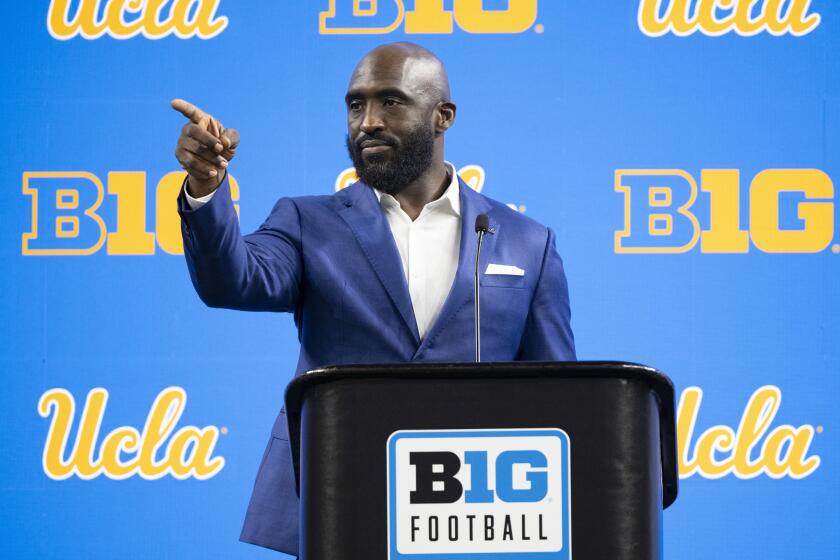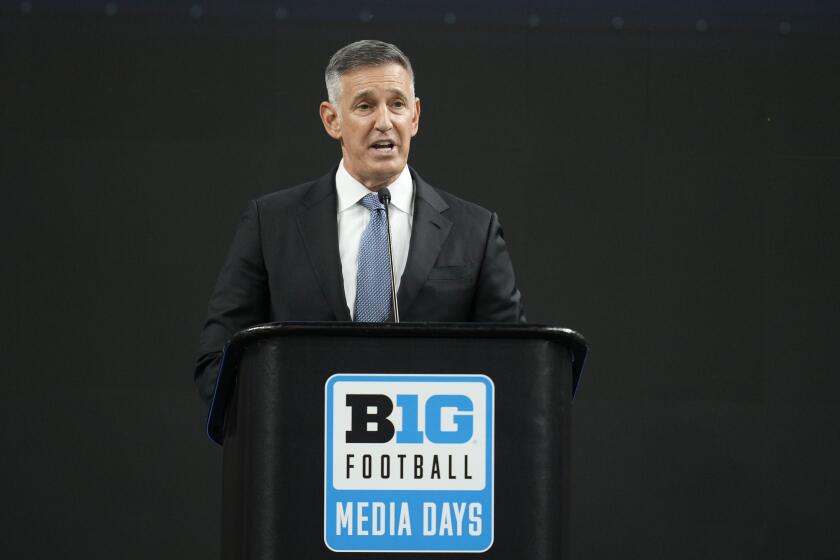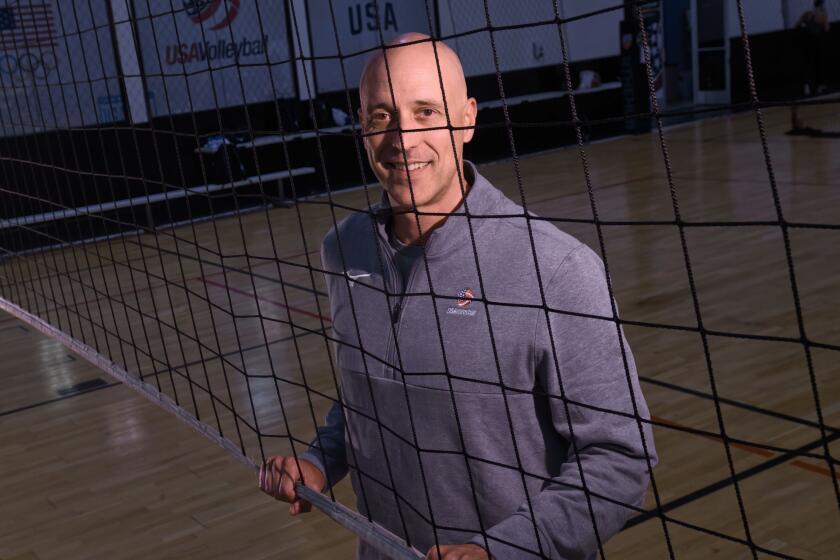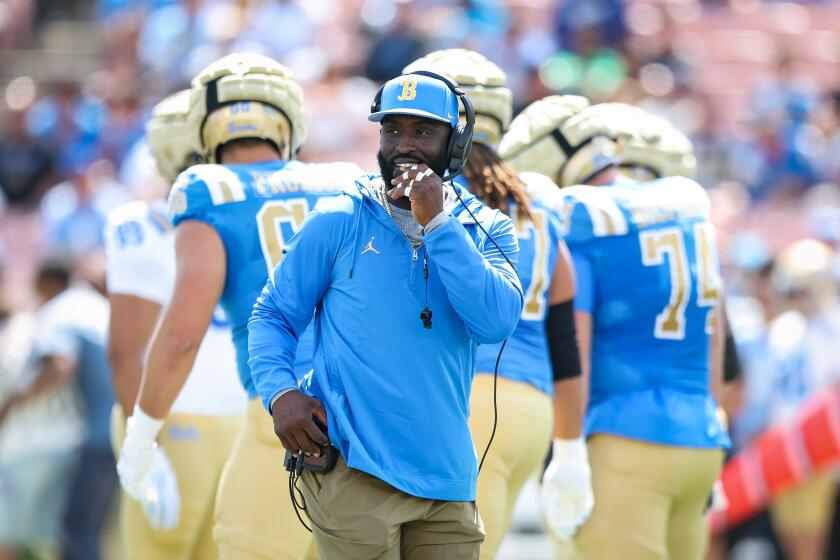What’s on the menu? For UCLA it’s offense
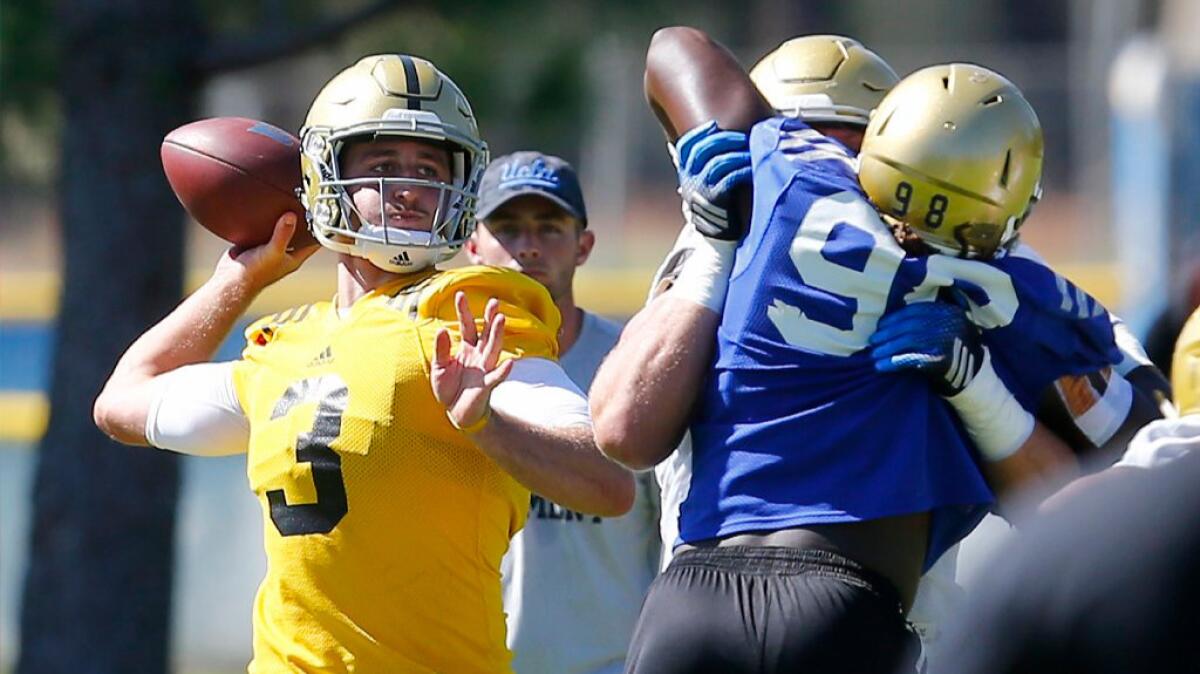
UCLA offensive coordinator Kennedy Polamalu calls the extensive package of plays that the Bruins will run this season “our menus.”
They were formulated to let quarterback Josh Rosen do much of the ordering.
Hungry for a mismatch? Rosen can dump the ball over the middle to Ainuu Taua and let the 294-pound fullback demolish a cornerback 100 pounds lighter.
Craving power? Rosen can hand off to one of three brawny tailbacks and let him run through openings created by what could be one of the best offensive lines in the Pacific 12 Conference.
Yearning to air it out? Rosen can pass to a slew of receivers that includes the shifty Ishmael Adams and the speedy Kenneth Walker III.
It all starts with a protection package and a play call that Rosen can change based on what he sees from the defense. The sequence is so complex that the same play can evolve from different formations and motions.
Rosen has made the X’s and O’s seem as elementary as a kindergartner reciting his ABCs through the first two weeks of training camp.
“Some of our verbiage can get really long,” Polamalu said. “Other quarterbacks would [say], ‘One more time, coach.’ I said it to [Rosen] once and, hey, bam, now he can go out there and look that [teammate] in the eye and say, ‘Hey, look, if we get this coverage, I’m coming to you.’ That’s pretty good for a young guy.”
UCLA reformulated its offense under Polamalu this year after he replaced the departed Noel Mazzone as offensive coordinator. The Bruins wanted a more physical, punishing style than the spread attack they ran under Mazzone. Much of the change also had to do with the presence of the heady Rosen.
The sophomore organized informal players-only practices this summer on campus, providing prep work for an offense that includes more formations and personnel groupings as a result of adding a tight end and a fullback. Instead of reacting on the fly to find an open teammate like he did as a freshman, Rosen now must go through a series of progressions to put the offense in the best possible matchup.
“There’s a lot you can do with it,” Rosen said. “You can run new plays you’ve never run before, but build them because the parts exist in the offense.”
There are so many options with UCLA’s new playbook — available in hard copy as well as a digital version — that Walker has dedicated 30 minutes a night to mastering it. The Bruins have kept some of the concepts they used under Mazzone, Polamalu said, because they worked; their offense twice ranked among the top 24 in the nation during Mazzone’s four-year stay.
Polamalu’s offense also has been influenced by many of the coaches he’s played for and worked beside during the four decades since he plodded along as a fullback for USC. Traces of John Robinson, Mike Shula, Norm Chow, Ted Tollner, Homer Smith and Dirk Koetter can all be found in aspects of what Polamalu has assembled.
Polamalu also wanted to better capitalize on the Bruins’ strengths: a massive offensive line, a deep if relatively inexperienced stable of running backs and receivers and a brainiac at quarterback.
“We had some guys in positions that maybe they weren’t thriving in,” Rosen said, “so then we moved them around a bit and they seem to be enjoying that.”
Taua was plucked from the defensive line and Nate Iese was converted to tight end after stints at linebacker, F-back and H-back. Adams was shifted to receiver because of a surplus of talent in the secondary.
Rosen will largely operate under center in what will be a more deliberate offense than the Bruins ran in recent seasons. Part of becoming more physical is creating opportunities for tailbacks Nate Starks, Bolu Olorunfunmi and Soso Jamabo to have success running the ball even in situations when opponents figure UCLA will run.
The Bruins also want to utilize Adams’ big-play potential as often as possible.
“We need to find a way and situations to get the ball in his hands,” Polamalu said, “because he’s pretty electric.”
Polamalu worked as offensive coordinator under Lane Kiffin at USC from 2010-12 but didn’t call plays, ceding that responsibility to his boss. It might feel at times this season like he has stepped aside in favor of his quarterback.
“He knows if he sees pressure to put us in the proper play,” Polamalu said of Rosen. “We don’t want to run a play that we can’t block up, so he’s pretty bright in understanding that.”
Follow Ben Bolch on Twitter @latbbolch
Go beyond the scoreboard
Get the latest on L.A.'s teams in the daily Sports Report newsletter.
You may occasionally receive promotional content from the Los Angeles Times.

